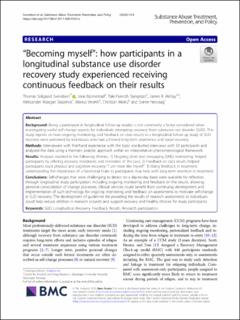| dc.contributor.author | Svendsen, Thomas Solgård | |
| dc.contributor.author | Bjørnestad, Jone Ravndal | |
| dc.contributor.author | Slyngstad, Tale Ekeroth | |
| dc.contributor.author | McKay, James R. | |
| dc.contributor.author | Skaalevik, Alexander Waagan | |
| dc.contributor.author | Veseth, Marius | |
| dc.contributor.author | Moltu, Christian | |
| dc.contributor.author | Nesvåg, Sverre Martin | |
| dc.date.accessioned | 2021-04-12T12:59:37Z | |
| dc.date.available | 2021-04-12T12:59:37Z | |
| dc.date.created | 2020-04-23T12:39:15Z | |
| dc.date.issued | 2020-01 | |
| dc.identifier.citation | Svendsen, T.S., Bjørnestad, J., Slyngstad, T.E. et al. (2020) “Becoming myself”: how participants in a longitudinal substance use disorder recovery study experienced receiving continuous feedback on their results. Substance Abuse Treatment, Prevention, and Policy, 15 (1), 1-9. | en_US |
| dc.identifier.issn | 1747-597X | |
| dc.identifier.uri | https://hdl.handle.net/11250/2737340 | |
| dc.description.abstract | Background
Being a participant in longitudinal follow-up studies is not commonly a factor considered when investigating useful self-change aspects for individuals attempting recovery from substance use disorder (SUD). This study reports on how ongoing monitoring, and feedback on data results in a longitudinal follow-up study of SUD recovery were perceived by individuals who had achieved long-term abstinence and social recovery.
Methods
Interviewers with first-hand experience with the topic conducted interviews with 30 participants and analysed the data using a thematic analytic approach within an interpretative–phenomenological framework.
Results
Analyses resulted in the following themes. 1) Ongoing short text messaging (SMS) monitoring: helped participants by offering recovery milestones and reminders of the past. 2) Feedback on data results helped participants track physical and cognitive recovery: “I am more like myself”. 3) Using feedback in treatment: understanding the importance of a functional brain to participants may help with long-term retention in treatment.
Conclusions
Self-changes that were challenging to detect on a day-to-day basis were available for reflection through longitudinal study participation, including ongoing monitoring and feedback on the results, allowing personal consolidation of change processes. Clinical services could benefit from continuing development and implementation of such technology for ongoing monitoring and feedback on assessments to motivate self-change in SUD recovery. The development of guidelines for providing the results of research assessments to individuals could help reduce attrition in research projects and support recovery and healthy choices for study participants. | en_US |
| dc.language.iso | eng | en_US |
| dc.publisher | BioMed Central | en_US |
| dc.rights | Navngivelse 4.0 Internasjonal | * |
| dc.rights.uri | http://creativecommons.org/licenses/by/4.0/deed.no | * |
| dc.subject | helsefag | en_US |
| dc.subject | rusmisbruk | en_US |
| dc.subject | recovery | en_US |
| dc.title | “Becoming myself”: how participants in a longitudinal substance use disorder recovery study experienced receiving continuous feedback on their results | en_US |
| dc.type | Peer reviewed | en_US |
| dc.type | Journal article | en_US |
| dc.description.version | publishedVersion | en_US |
| dc.rights.holder | © The Author(s). 2020 | en_US |
| dc.subject.nsi | VDP::Medisinske Fag: 700::Helsefag: 800 | en_US |
| dc.source.pagenumber | 1-9 | en_US |
| dc.source.volume | 15 | en_US |
| dc.source.journal | Substance Abuse Treatment, Prevention, and Policy | en_US |
| dc.source.issue | 1 | en_US |
| dc.identifier.doi | 10.1186/s13011-020-0254-x | |
| dc.identifier.cristin | 1807679 | |
| cristin.ispublished | true | |
| cristin.fulltext | original | |
| cristin.qualitycode | 1 | |

